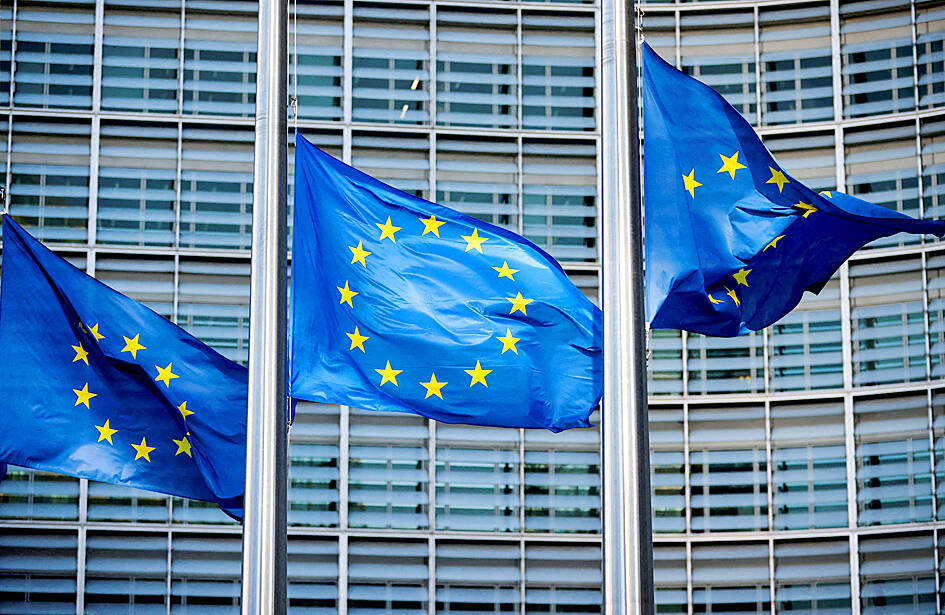EU states and lawmakers clinched a deal on Tuesday to expand Europe’s clean tech production, from solar and wind to carbon capture, as the bloc faces off with China and the US.
Brussels wants to reduce its reliance on China and make Europe more attractive for investment after the US unleashed a US$369 billion bonanza of clean technology subsidies last year.
The EU announced the plans last year, spurred by concerns the US program, which includes tax credits, would lure European manufacturers away.

Photo: Reuters
Belgium, which holds the rotating EU presidency, announced that negotiators had reached a provisional agreement. The European Commission wants at least 40 percent of green tech used in the EU to be produced in the bloc by 2030.
The law lists “strategic” technologies including nuclear energy as well as renewable energies like solar and wind.
The 40 percent target features in plans for a Net-Zero Industry Act to support the EU’s bid to become a carbon-neutral economy by 2050.
Under the law, public tenders would be weighed on criteria that could favor European companies, to counter similar moves by Beijing and Washington. The draft also seeks to make sure businesses can obtain permits faster. It is to enter into force after formal approval by EU states and the parliament.
“The most important thing is just to bring investment back to Europe and create a level playing field,” Solar First Inc’s European business chief Anja Lange said.
Access to clean tech — and avoiding an overreliance on imported technology — is a major source of concern in Europe, and many fear the draft law alone might not be enough to change the equation.
China dominates the solar power industry, and Europe’s solar panel manufacturers have made repeated pleas for help from Brussels, accusing Beijing of not playing fairly.
Last year, the EU opened a probe into Chinese electric car subsidies, and there are hopes among some in the industry that it will launch another investigation into Chinese solar panels.
However, European Commissioner for Financial Services Mairead McGuinness tamped down any such hopes on Monday, saying the bloc must carefully consider the impact of its actions.
“Any potential measure needs to be weighed against the objectives we have set ourselves when it comes to the energy transition,” she told lawmakers in Strasbourg.

Taiwan’s rapidly aging population is fueling a sharp increase in homes occupied solely by elderly people, a trend that is reshaping the nation’s housing market and social fabric, real-estate brokers said yesterday. About 850,000 residences were occupied by elderly people in the first quarter, including 655,000 that housed only one resident, the Ministry of the Interior said. The figures have nearly doubled from a decade earlier, Great Home Realty Co (大家房屋) said, as people aged 65 and older now make up 20.8 percent of the population. “The so-called silver tsunami represents more than just a demographic shift — it could fundamentally redefine the

The US government on Wednesday sanctioned more than two dozen companies in China, Turkey and the United Arab Emirates, including offshoots of a US chip firm, accusing the businesses of providing illicit support to Iran’s military or proxies. The US Department of Commerce included two subsidiaries of US-based chip distributor Arrow Electronics Inc (艾睿電子) on its so-called entity list published on the federal register for facilitating purchases by Iran’s proxies of US tech. Arrow spokesman John Hourigan said that the subsidiaries have been operating in full compliance with US export control regulations and his company is discussing with the US Bureau of

Businesses across the global semiconductor supply chain are bracing themselves for disruptions from an escalating trade war, after China imposed curbs on rare earth mineral exports and the US responded with additional tariffs and restrictions on software sales to the Asian nation. China’s restrictions, the most targeted move yet to limit supplies of rare earth materials, represent the first major attempt by Beijing to exercise long-arm jurisdiction over foreign companies to target the semiconductor industry, threatening to stall the chips powering the artificial intelligence (AI) boom. They prompted US President Donald Trump on Friday to announce that he would impose an additional

China Airlines Ltd (CAL, 中華航空) said it expects peak season effects in the fourth quarter to continue to boost demand for passenger flights and cargo services, after reporting its second-highest-ever September sales on Monday. The carrier said it posted NT$15.88 billion (US$517 million) in consolidated sales last month, trailing only September last year’s NT$16.01 billion. Last month, CAL generated NT$8.77 billion from its passenger flights and NT$5.37 billion from cargo services, it said. In the first nine months of this year, the carrier posted NT$154.93 billion in cumulative sales, up 2.62 percent from a year earlier, marking the second-highest level for the January-September